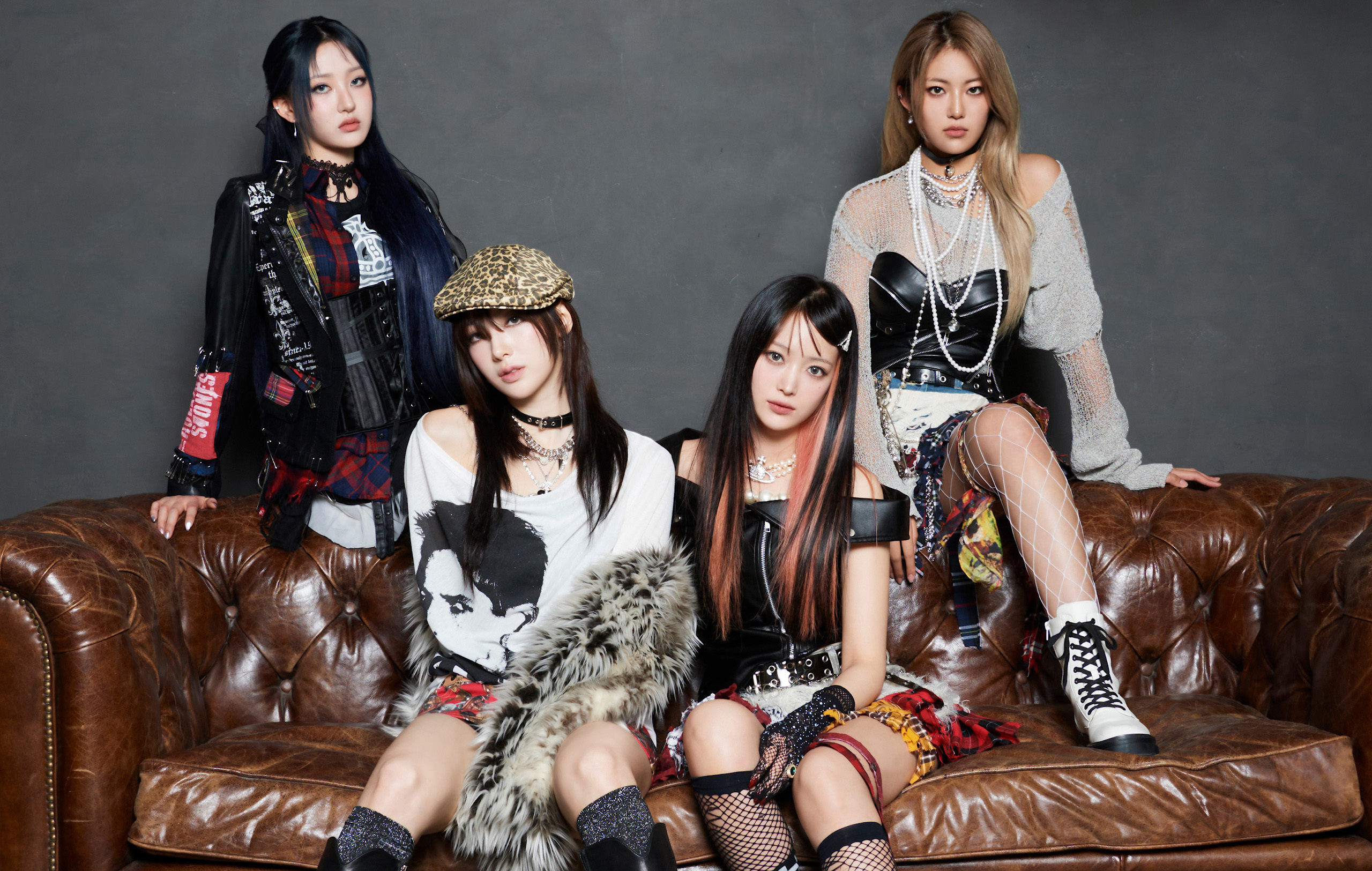H1-KEY were born for the spotlight. From Riina, who’d always pictured her future-self holding a mic, to Hwiseo, who was already sweeping dance competitions by the age of seven, there was never another path for them. Even youngest member Yel – who proclaimed in her teens that she, unlike many of her peers, had no interest in becoming a K-pop star – yearned for the limelight through her dance aspirations. In the K-pop industry, hundreds (if not thousands) sacrifice years of their lives for a chance at fame. H1-KEY are no different, but where so many dreams have failed to take flight, they have managed to cut through the noise – not only with their talents, but with their hearts.
H1-KEY on The Cover of NME. Credit: Sewon Jun for NME
While the prologue to H1-KEY’s story was written out of pure ambition, the wearying path they later took has led them to a more meaningful purpose. Even before their debut in 2022, the girl group had their share of faith-shaking moments. Hwiseo, who spent an astounding nine years as a trainee, tells NME that she “came close to debuting” several times, only for those chances to fall through. Leader Seoi, a self-described people person, shares that it was particularly painful to watch friends drop out of the gruelling training process one by one. “I started to learn about the ‘real world’, life and society in a way,” she muses. “There were a lot of fun moments, but there was also a lot of getting hurt, learning and maturing.”
Although it’s hard to picture H1-KEY without her now, Hwiseo was not always a part of the act. Seoi, Riina and Yel initially debuted alongside Thai model and influencer Sitala, whose controversial background eclipsed any attention they managed to garner with their debut single ‘Athletic Girl’. When she left the group – just months after their debut – Hwiseo took her place. Line-up changes are often quickly glossed over in the K-pop industry, but as candidly as she can, Riina reflects on what she calls a “difficult and challenging time” for the group. “[Sitala] was someone we worked hard together with to chase our dreams, and suddenly she was gone, and then it was just us three,” she says. “In a way, it made us stick together even more, appreciate each other. Almost a motivation, if you will.”
Seoi of H1-KEY. Credit: Sewon Jun for NME
While H1-KEY were going through growing pains, Hwiseo was finally getting ready to kick-start her career, but as a soloist. “I was already in the process of recording music when I got the offer to join this existing group,” she reveals. “To be honest, one of the things I thought was that we didn’t make our start together, so I did feel some hesitation.” Despite her reservations, Hwiseo was eventually persuaded by her mother – whom she credits along with her father for cultivating her passion for performing – to join H1-KEY. “I had previously trained in groups, so I got quite lonely preparing for my solo debut. Somehow my mum knew that,” she says.
Barely acquainted with their new bandmate, the group were quickly whisked off to Los Angeles to film the music video for the infectiously upbeat single ‘Run’, their first release with Hwiseo. “Not only was it our first time working together, it was also our first time in LA. Everything was so new to us,” Seoi says. Yet, she recalls having a “really good feeling” about the new line-up and how they were quickly they were able to bond. “I don’t think more years together necessarily equates to greater teamwork. You could train with someone for years and never talk,” Yel adds. “But we really talk and share a lot with each other, communicate and grow together, and that’s what’s important.”
Riina of H1-KEY. Credit: Sewon Jun for NME
With ‘Run’, H1-KEY found their bearings – and their sound. They sidestepped the girl crush trend for an earnest pop-rock number, infused with the youthful, uplifting energy that would form the foundation of their future. But the uneasiness of the months prior continued to follow the group, and when the song failed to make a splash, they began to worry. “We aren’t from a big company, so I did manage my expectations, but even considering that, things just weren’t really happening,” says Yel. “My belief and trust in myself was being shaken, and that’s what really scared me. When you lose trust in yourself, it’s like – OK, now who else can I trust, if not myself?”
“One thing about H1-KEY is that we speak for the youth” – Riina
Despite their uncertainty, H1-KEY forged ahead, unaware that their breakthrough was just on the horizon. Released exactly a year after their debut, ‘Rose Blossom’ was almost like a reintroduction for the girl group, and just the spark they needed. “We basically bet our lives on this [song],” Hwiseo admits. She recalls how “wholeheartedly” the group related to the bittersweet track, written by Day6’s Young K, which paints an inspiring picture of roses blooming against all odds in a harsh concrete jungle. “When we got the song we were like, ‘This is our story’.”
Hwiseo of H1-KEY. Credit: Sewon Jun for NME
As ‘Rose Blossom’ slowly ascended South Korean music charts, the group became known as “healing idols” for the song’s encouraging and relatable message. It was at this point too that they began to realise the power of their music. “We sometimes receive stories from fans,” Riina says, recounting one from an athlete who struggled to return to his sport after a debilitating injury. “He stopped for a long time, but after listening to ‘Rose Blossom’, he got back into it. Another spoke about how ‘Rose Blossom’ helped his mother through a really painful time.” It is moments like these, she says, where it “really hits me that our music can impact people positively.” That’s what Riina loves most about being a K-pop idol.
As much as H1-KEY initially craved superstardom, their goals have slowly shifted toward something greater. ‘Rose Blossom’ was a turning point in more ways than one – the quartet realised they had carved out a space in the crowded K-pop landscape as a voice for their generation. “One thing about [us] is that we speak for the youth,” Riina says, a sentiment that’s not only reflected in their August 2023 mini-album, ‘Seoul Dreaming’, but also their upcoming project, ‘Love or Hate’.
“We communicate and grow together, and that’s what’s important” – Yel
“The recurring idea is that we resonate with the youth, and sometimes that can mean giving hope and being about growth or getting hurt,” she says. It’s also about not being “lukewarm”, or half-hearted in life, she adds. H1-KEY would know – after all, it was a do-or-die attitude that helped them turn their dreams into reality. That tenacious conviction manifests itself on lead single ‘Let It Burn’, a moody pop-punk number that lends a rebellious edge to their usual uplifting energy.
For Seoi, their new record boils down to “that feeling of ‘screw it, let’s do it, whatever the outcome is, let’s go and kill it’”. And through empowering others, H1-KEY are also learning to better understand and express their own thoughts and emotions, a process captured on this record in the song ‘ Letter’. “[It] actually started as letters we wrote to each other, about how we want to live and how we want to go forward in the future,” Hwiseo shares. “Things that we want to remember, be thankful for and moments where we felt sorry to one another.”
Yel of H1-KEY. Credit: Sewon Jun for NME
But personal growth takes time, with Riina admitting that the group “still haven’t shown these letters to each other” just yet. When asked if they have an idea of what each other might have written, the members’ eyes dart to each other and they let out a chorus of laughter. “We don’t know for sure, but I think we can guess [by] looking at the lyrics,” Seoi says with a knowing smile. For Yel, she believes that this “honesty” and “spilling out of emotions” is just one way the group define themselves.
“K-pop idols can be quite flashy and all, but in a way, I guess we’re a bit different,” Seoi adds. Though H1-KEY’s story is only just beginning, the girl group have already given considerable thought to the legacy they would like to leave behind. “People say that music can be healing, and since ‘Rose Blossom’, we’ve been taking the lead on that in K-pop – at least, I would like to think that we are,” she says. “The themes of hope and courage, we’re hoping that [listeners] empathise and identify with that.”
Beyond the glitz and glamour that idol life promises, the quartet’s ambitions are now a little more intimate. “We want our music to be able to live with a person,” Riina muses. “Maybe not transform someone’s life completely, but perhaps give them some determination or touch their heart.” While H1-KEY sing for the youth of today, the group hope their music will become something greater than themselves. “When you talk to older people, sometimes they mention specific songs that helped them overcome tough times, or that a song reminds them of a certain time in life. That’s what I want.”
H1-KEY’s mini-album ‘Love or Hate’ is out June 19 via GLG
Listen to H1-KEY’s exclusive playlist to accompany The Cover below on Spotify and here on Apple Music
Writer: Gladys Yeo
Photographer: Sewon Jun
Photographer Assistant: Seongho Lee, Sungyun Lim
Shoot Visual Director: Roy Back
Stylist: Cheeky
Assistant Stylist: Choi Jiwon
Hair & Make-up: JOY187
Hair Stylist: Jiny, Lee Haeun
Assistant Hair Stylist: Lee Hyebin
Make-up Artist: Lee Seowon, Kim Heejin
Assistant Make-up Artist: Son Yujin
Local Production and PR: SKY720 (Jin Choung, Anastasia Kuvaldina, Niken Koesoemo, Zuza Frymark)
Label: GLG
The post H1-KEY: the K-pop group becoming the voice of their generation appeared first on NME.




